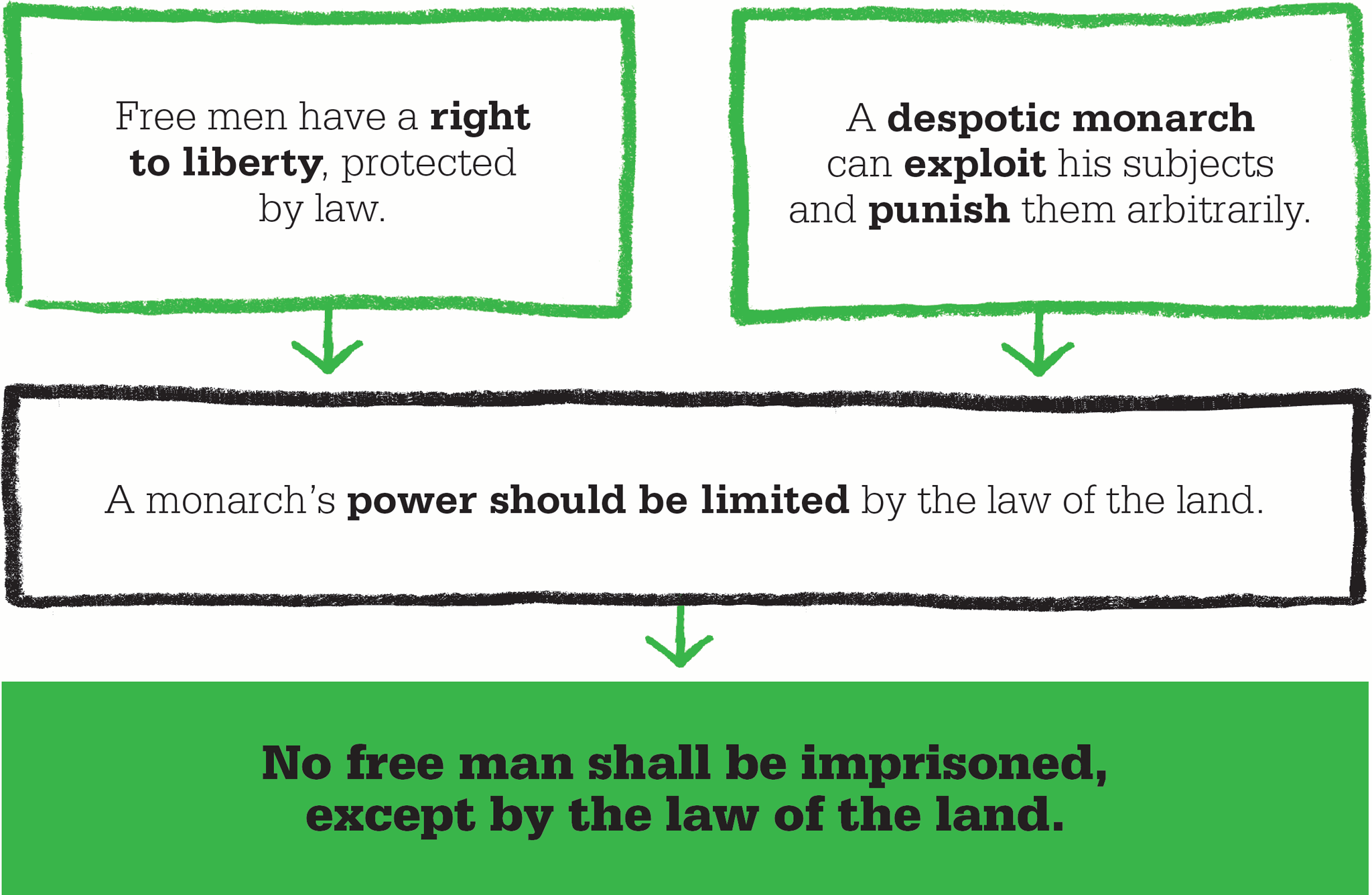
IN CONTEXT
Parliamentarism
Liberty
c.509 BCE The monarchy in Rome is overthrown and replaced by a republic.
1st century BCE Cicero argues for a return to the Roman Republic after Julius Caesar takes power from the Senate.
1640s The English Civil War and subsequent overthrow of the monarchy establish that a monarch cannot govern without parliamentary consent.
1776 The Declaration of Independence lists “Life, Liberty, and the pursuit of Happiness” as inherent rights.
1948 The United Nations General Assembly adopts the Universal Declaration of Human Rights in Paris.
King John of England became increasingly unpopular during his reign due to his mishandling of the wars with France and his high-handed attitude toward his feudal barons, who provided him with both knights and tax revenue. By 1215, he faced rebellion and was forced to negotiate with his barons when they arrived in London. They presented him with a document detailing their demands—modeled on the Charter of Liberties of 100 years earlier issued by King Henry I—which effectively reduced John’s power and protected their own privileges. The “Articles of the Barons” included clauses relating to their property, rights, and duties, but also made the king subject to the law of the land.

Freedom from tyranny
Clause 39, in particular, had profound implications: “No free man shall be seized or imprisoned, or stripped of his rights or possessions, or outlawed or exiled, or deprived of his standing in any other way, nor will we proceed with force against him, or send others to do so, except by the lawful judgment of his equals or by the law of the land.” Implicit in the barons’ demands was the concept of habeas corpus. This requires that a person under arrest be brought before a court, and protects individuals from arbitrary abuse of power. For the first time, the freedom of the individual from a tyrannical ruler was explicitly guaranteed. John had no choice but to accept the terms and attach his seal to what later became known as the Magna Carta (Latin for “Great Charter”).
"To no man will we sell, or deny, or delay, right or justice."
Magna Carta, Clause 40
Unfortunately, John’s assent was only a token, and much of the document was later ignored or repealed. Nevertheless, the key clauses remained, and the spirit of Magna Carta was highly influential in the political development of Britain. The restriction of the power of the monarch in favor of the rights of the “free man”—which at the time meant only the feudal landowners, and not the serfs—laid the foundations for an independent parliament. The rebellious De Montfort’s Parliament in 1265 was the first such body, featuring elected representatives, knights, and burgesses (borough officials) as well as barons for the first time.
Toward a parliament
In the 17th century, the idea of making the English monarch bound by the law of the land came to a head in the English Civil War, and Magna Carta symbolized the cause of the Parliamentarians under Oliver Cromwell. Although at the time it applied only to a minority of already privileged citizens, Magna Carta pioneered the idea of laws to protect the liberty of the individual from despotic authority. It also inspired the bills of rights enshrined in many modern constitutions, particularly those of the United States, as well as many declarations of human rights.

The Houses of Parliament in London, England, has its origin in the insistence of the barons in 1215 that the monarch could not levy additional taxes without the consent of his royal council.
FEUDAL BARONS OF ENGLAND

First created by William the Conqueror (1028–87), the barony was a form of feudal land tenure granted by the king, with certain duties and privileges allocated to the holder. The barons paid taxes to the king in return for their holding of the land, but also had an obligation, the servitium debitum (“service owed”), to provide a quota of knights to fight for the king when asked. In return, the barons were granted the privilege of participation in the king’s council or parliament—but only when summoned to do so by the king. They did not meet regularly and, since the king’s court often moved from place to place, they did not have a regular venue.
Although the barons at the time of King John (pictured above) forced Magna Carta on their king, the power of the feudal barony weakened during the 13th century, and was rendered all but obsolete during the English Civil War.
Key works
1100 Charter of Liberties
1215 Magna Carta
See also: Cicero • John Locke • Montesquieu • Jean-Jacques Rousseau • Oliver Cromwell
